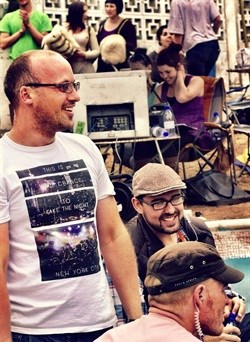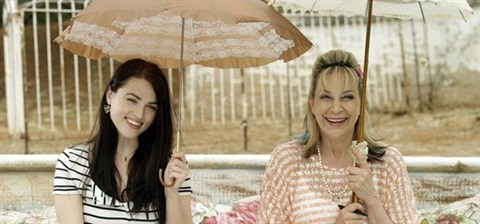
It will be released by FreeStyle Releasing in the US in the summer of 2015. It has a theatrical release across North America and there's already interest from China, Spain, Australia, Ireland, etc. The DVD will be released in the US by Sony.
The story uses a British actress to give a very unique and interesting perspective on South Africa. I really like looking at 'us' through this lens and more specifically the Afrikaner community. To me, South Africans are quirky and have the ability to laugh at themselves. The story effortlessly entertains the international, the South African English and the local Afrikaans market.
Tina Kruger is a young gun and this was her first screenplay. She worked hard and learned fast and it was, overall, a very positive experience. I always write alone, we just planned the drafts she wrote together and allocated time for her to write in solitude. Writing is a very unromantic and labour-intensive job for me and I write best in solitude.
Planning the script and beats together certainly does. If your writing partner is strong enough to challenge your ideologies. In writing the script we had some interesting discussions about the characters, yet I had discussions like that with an array of people, like my producer and business partner Llewelynn Greeff, too. It always helps to talk about your characters and plot ideas with other people; it allows a fresh perspective and forces you to think about all the variables.

The films we get involved in at Dark Matter Studios are financed very quickly due to their commercial potential and our track record, so finding the money was a challenge that we solved in record time. The writing of the script is always the biggest challenge and we spend about a year on developing it. Our production team and creatives were really the best South Africa had to offer and they helped me execute the perfect translation style for the film. The cast was quite a challenge, because we wanted to use recognisable international talent. But after winning the audience award for Fanie Fourie's Lobola the process became much easier. The international distribution was an almost impossible task, yet we kept knocking on doors until one opened.
I wrote the film, thinking both of the creative and the budget. I packaged the film and partially financed it. My business partner, Llewelynn Greeff, then took the producing reins from me and raised the rest of the budget of the film. Llewelynn was also in charge of both the production of the film and the marketing, and did a stellar job. I then concentrated on the creative and quality control of the content as a director.
I think it's quite an accurate observation, yet they all have a different tone and market in mind. I think Leading Lady is the ultimate feel-good-film with a coming-of-age film that explores Jodi's journey in finding her own value and significance. These are all relevant themes to me at the moment, as a filmmaker trying to make his mark in the international arena.
I think it's due to the rich history between the British and the Afrikaner/South African culture. I really looked at the archetypical British person and tried to make her as universally identifiable as possible, without alienating her from her culture. Everything in Leading Lady is conveyed as honestly as possible; we really aimed to tell a gentle story with as much cultural depth as possible. I also feel that the Afrikaans culture has a very interesting and unique history that form their current ideologies and I have tried to delve into these idiosyncrasies emotively without making the film didactic.
Not really, no. I see the point in pair bonding, where a relationships benefits both parties and is mutually beneficial to both parties' growth, but I am not the butterfly and fluffy poetic type of guy. I think I use to be like that, but life has a way to scalp our expectations into mathematical equatable emotional transactions, so my outlook in terms of romance is usually to live as much as possible in the moment and not to add the unnecessary pressure of expectation to the mix.
Thank you. I directed the actors to downplay the comedy a lot, to make it as realistic as possible. I always find films funnier when the comedy is character driven, as opposed to slapstick and event driven. I believe that character-driven comedy has the built-in potential to travel better, too, and does not alienate people from different LSMs (Living Standard Measures).

I do not really concern myself much with my 'success', because every film I make is a brand new project, with its own challenges. In fact, I don't really look at myself as successful; my ambition to be an international filmmaker is still in its baby shoes and I guess I won't feel like I have achieve much before I build an international recognisable business and studio. South Africa is an incredibly small territory compared to the rest of the world and to slam your chest too hard about making a couple of successful films here seems like a mistake to me.
There is obviously a lot of 'keys' to unlocking success; what has worked for me so far is to be a creative problem solver. The more creative ways you solve problems successfully makes your business more innovative and unique. I feel that too many production houses in South Africa are creating films that borrow too many story lines from Hollywood and unoriginal films like that will probably never travel.
Yes. Success could be to create a one-hit wonder, yet to keep making movies that keep surprising their audience; that is being successful. I see my career as a pyramid, where every film I make allows me to build a foundation higher from the ground, on top of each other. I think the biggest mistake a production company can make is to try to repeat their previous recipe for success. A film can only happen once and innovation is the key to keep the business and your career growing.
In 2008 only four film were made, or less, if I remember correctly. Now, 40-plus films are made locally. Thus, the onus will fall on marketing and your PR campaign, as well as creating original content. It's not enough anymore to think of an Afrikaans film, or any other language, as a niche people would be interested in watching. You have to think outside of these tried, tested and failed ideologies to create something refreshingly new that nobody has thought about yet. We spend a substantial lot of money a year on developing scripts and concepts at Dark Matter Studios, spending money on development sounds like a great way to ensure the future growth of our business.
Most content will be distributed online. When the network providers stop exploiting South Africans with their insanely expensive data, South Africa will start indulging heavily on online content. I predict that only the massive franchises, like Marvel, will have a cinema release. Internet-dependent, description-based companies like Netflix will rule the media industry until the next great innovation.
Yes, most definitely. Most people fear change, but change is inevitable and those who do not adapt will fail. In a trend-setting industry like the media industry, you have to be a trend setter and not a trend follower.
My business partner, Llewelynn Greeff, lives in the UK. The pound is the strongest currency in the world; it makes sense to keep most of your revenue in the UK. Until global warming turns out to be a massive real problem and the muddy island is washed away by ice melting in the North Pole and everyone rushes to the Drakensberg. Then we will set up shop there. Wait that sounds like a movie that was already made... We are opening a branch in the US soon and will then be able to travel comfortably between these three great countries.
A feel-good injection. Everyone who watches the film walks out of the cinema with a smile. The smiles make everything worthwhile.
There are writers and directors in LA who prefer to specialise in a genre. I want to be viewed more as a chameleon that keeps changing his colours. It forces me to think of every little beat I create and not to be in autopilot mode when I write or direct a film. From a business perceptive it also opens more doors to a different array of distributors that sometimes specialise in different genres too.
A clumsy, over-analytical clown.
I travel a lot. I enjoy an array of restaurants and watch a copious number of films. I love spending time with people who are not or in the entertainment industry, seeing that talking shop can get a little too much sometimes. I have recently started doing Muay Thai as a way to escape my over-analytical mind.
I want to build Dark Matter Studios, with Llewelynn Greeff, into a global powerhouse that provides content across all media platforms.
I see dreaming a little like procrastination and do not indulge in it too often. I try to plot my dreams into clear, achievable objectives. Our goals are never too high to reach; they just take time, planning and effort to achieve.
Read more about Leading Lady and other new films opening this week at www.writingstudio.co.za
